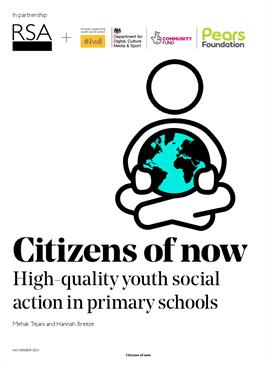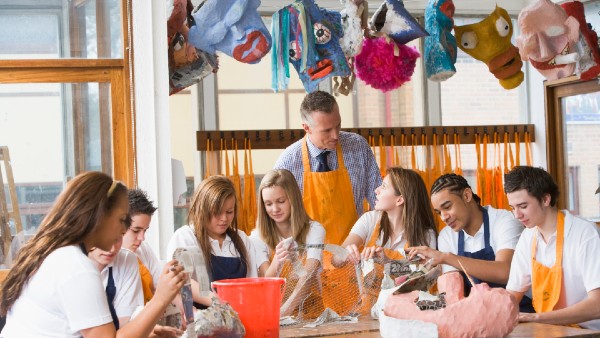Too many primary school pupils are missing out on the benefits that youth social action has to offer. How can we make sure opportunities to make a difference to the issues they care about are fairly shared among our youngest citizens?
Participating in high-quality youth social action opportunities has a ‘double benefit’. It benefits both the young people involved and their communities. We want to encourage more primary schools to make the most of the opportunities and benefits high-quality youth social action has to offer.
Over the last three years, in partnership with the Pears #iwill Fund, the RSA has been exploring this. We designed, delivered, and evaluated RSA4, a youth social action programme for Year 4 pupils.
Our action research investigated what high-quality youth social action looks like in a primary school setting and what enables or limits teachers’ abilities to embed youth social action into their practice. The report’s title, ‘Citizens of Now’ challenges us to see primary-age pupils as active citizens who can make a difference today, rather than discounting them as changemakers of some distant future.
This report is a celebration of the RSA4 schools’ efforts and achievements, and we hope that with the practical guidance, it inspires more teachers to lead youth social action in their own settings, empowering pupils to be socially responsible citizens of now.
What is required for high-quality youth social action in primary schools?
Through our action-research we have identified several active ingredients that enable the six high-quality youth social action in primary schools:
For creating high-quality opportunities for pupils:
- Pupils have ownership over the goal and the means of the youth social action project
- Pupils feel connected to their local community and part of something bigger
- Pupils perceive that the project is sufficiently difficult, including feeling a sense of ‘controlled discomfort’
- Pupils feel that the project is successful
- Pupils are supported to recognise of their personal development.
For overcoming practical and ethical challenges:
- School leaders drive a culture of youth social action that helps to overcome teacher-level barriers to engagement.
- Schools foster a culture that encourages youth-voice
- Schools are connected and engaged with their local community
- Teachers have confidence in teaching sensitive and/or controversial issues
Practical guidance for educators
In order to support these active ingredients, here is some practical guidance for teachers on how to facilitate high-quality youth social action:
- Explore the issue in full: Provide plenty of learning opportunities for pupils to better understand their chosen social issue
- Give pupils agency: Allow pupils to lead, shape, and own their youth social action project
- Get to know your community allies: Your local community is a great resource for you to draw upon to enhance the quality of youth social action
- Link to your curriculum: Adapt your scheme of work to incorporate the chosen social issue across different subjects
- Make it relevant to your school: Embed youth social action within your school and practice
- Agree milestones for reflections: Create a sense of commitment and accountability by agreeing on milestones, as well as what good would look like at each stage
You can also download a summary of the report (PDF, 266KB)
Acknowledgments
We are grateful to the Pears #iwill Fund for supporting our work on social action with primary schools over the past three years. The Pears #iwill Fund is created by Pears Foundation, and match funded by the #iwill Fund, a £54 million joint investment from The National Lottery Community Fund and the Department for Digital, Culture, Media and Sport (DCMS). The #iwill Fund brings together a group of organisations who all contribute funding to embed meaningful social action into the lives of young people. The #iwill Fund supports the aims of the #iwill movement – to make involvement in social action a part of life for young people, by recognising the benefit for both young people and their communities. By bringing together funders from across different sectors, the #iwill Fund is helping to grow more high-quality social action opportunities for young people through programmes such as RSA4.
pdf 634 KB

Related articles
-
We need to teach children new forms of literacy
Comment
Lazar Dzamic
Knowing how to read and write is no longer enough. Lazar Dzamic argues that we need to arm our young with new literacies, to fight narratives sold by media, politicians, religion, the entertainment industry and big business.
-
Artificial intelligence: the creative edge
Comment
Alex Soulsby
How should schools respond to AI? Alex Soulsby calls for a greater focus on the arts to help students develop their creativity, critical thinking, adaptability and emotional intelligence.
-
Invitation: Philanthropic networking event
Fellowship news
Innovation professional Jess Denny FRSA invites London Fellows to a philanthropic networking event at The Steps in the RSA House.





